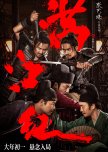
My dear, I don't give a damn.
Gone with the Rain is one of the few Chinese dramas out there that has a very apt English title. It is also set in a time of civil war and the design of the four main characters are unmistakably inspired by Margaret Mitchell's epic classic novel Gone with the Wind. It is very much a character drama that is at surface a romance, but the true love story is the one between two women who are almost diametric opposites of one another.This story takes place in a fictional Jing state but the costumes and background suggests this loosely is late Tang dynasty when the powerful local military governors rebelled. Vast swarths of the country was thrown into civil war during which the central government had little knowledge or control over what was happening. The drama's greatest failing is that it is very sloppy in terms of clearly explain who the different factions and what their agendas are. Events unfold conveniently and not always logically simply to enable character conflict and development.
The story is told largely from seventeen year old Tang Moxi's perspective. She breaks the fourth wall in the beginning and continues to share her thoughts via very vivid, at times funny and at times silly daydreams. Moxi is illegtimate and orphaned at an early age, she grows up on sufference in the household of her uncle Bai Wentao a scheming mid-level official. Her first cousin Bai Fengyao its the only one that cares for her. The drama opens with the country on the verge of civil unrest. The cousins are colluding to evade their family's efforts to marry them off for advancement. Moxi rescues a dashing wounded soldier Wan Jiagui and falls for him. She also encounters an infuriating general Chen Wende. Through a series of misunderstandings, some self inflicted Moxi finds herself caught between both men while Wan Jiagui finds himself engaged to both women. A tortuous romantic quadrangle between the four plays out as the country slides into chaos. The romances are secondary to how the relationship between the women navigates civil war and a messy love rivalry.
Despite their different personalities and perspectives, Moxi and Fengyao share a touching and unbreakable bond. Moxi is fiesty, selfish, cynical, manipulative and tough as nails beneath her lovely exterior. She is above all a survivor; she has to be as there is only the rather helpless Fengyao in her corner. Fengyao is pretty much everything Moxi is not - selfless, well educated, gentle, sentimental, idealistic,and impractical; in other words quite useless. Their strengths and weaknesess complement and together, they are able to acutally fend quite well for each other. Unfortunately they both fall for the gallant, noble hero in heroes clothing Wan Jiagui who when tested is actually a weak character. Moxi spends most of the drama fighting her devastating attraction to Chen Wende, a rough, uncouth warrior who is more than what he appears to be. He is the only character that remains charismatic and likable throughout the drama. After awhile, it is quite obvious where these four main character blueprints are from.
The first half of the drama is quite enjoyable as Moxi and Fengyao find their strengths and struggle with their flaws in trying times. However, Moxi's wilful blindness and her obstinate pinning for her first love went on for so long it became tedious. I wanted to hurl my remote at her and yell "My dear, I don't give a damn!" Even though all the portrayals are well done and the characters are multi-dimensional, this drama spends too much time rehashing character flaws without a well fleshed out plot to keep things engaging. The conflict and attraction between Chen Wende and Moxi is the only highlight of the second half of the drama which made it less of a struggle. I also enjoyed the casting of an actress in the role of Wu Yin. The second relationship however is not sufficiently developed because all of the men can only have eyes for Moxi. The final arc is rushed and Moxi's ability to transform herself is not well explained and frankly impossible. The story does come to a satisfying ending with the final episodes making up for the sag in the latter half. This is different enough from the usual run-of-the-mill historical Chinese drama that I enjoyed many aspects of it. It is quite well acted and had it been shorter and more tightly written, I'd probably rate it better than 7/10.
Esta resenha foi útil para você?

Junk food with no calories: highly addictive and binge-worthy.
This is THE drama that revived my love for Chinese costume drama. I was hopelessly addicted and inconsolable after it ended. I hungered for the next Ten Miles of Peach Blossoms and was crushed and then frustrated when I realized there is nothing else like it. I still have to restrain myself from binge re-watching my favorite parts. My conscience always struggles with inflicting this on someone else so be warned: TMOPB will connect with you and compel you to fall in love with it but it will also ruin everything else you for a long time.At its heart, this drama very simply an intense, fantasy love fairy tale that spans three lives and three worlds. The plot is not complex, the CGI and some of the fight scenes are not the best and there are small holes and loose threads but nothing diminishes the utterly spell-blinding love story between Bai Qian (Yang Mi) and Ye Hua (Mark Chao).
In the first part of the story, Bai Qian is disguised as a boy Si Yin, the best loved disciple of Mo Yuan (also Mark Chao), the God of War. The young Bai Qian/Si Yin is a carefree, mischievous and indifferent student. A terrible betrayal by her first love that leads to a devastating war and the sacrifice of her beloved sifu Mo Yuan’s soul leaves Si Yin inconsolable with grief and remorse. If Bai Qian occasionally comes across as dislike-able, it is because Yang Mi did not successfully convey how deeply and utterly wounded Si Yin/Bai Qian was by these events. This transformed her into an aloof, cynical and outwardly cold goddess who closely guards her innately warm and loyal heart.
As for the Ye Hua character, part of his magic is there is no such thing as a Ye Hua - he is the brilliant, invincible and handsome Crown Prince of the powerful Celestial Tribe. He is also a great cook, a wonderful father and he loves only once and unconditionally. But underneath that too good to be true surface, he has his own glaring flaws. His first hopeless love is Susu, a lonely, kind heart-ed, docile mortal woman he meets on a chance encounter. It is an unequal relationship that was doomed to end in tears. As a result of his inexperience and hubris, he makes many miscalculations and ultimately betrays her in a way that tragically ends their relationship. He mourns her and waits for her return for hundreds of years and against all logic and odds. When he discovers Susu and Bai Qian are one and the same, he is elated and goes to extreme lengths to crack the ice around her heart and win her love and forgiveness. But Bai Qian is a much older and complicated woman who is initially dismissive of his puppy love. She is a high goddess and a queen and thus more than his equal. While he was thrilled by this spicier version of Susu, he finds to his frustration and fear that she has a past and her heart is not as easily won.
Mark Chao’s Ye Hua will forever be the defining Ye Hua. It doesn’t hurt that this dude has the best eye ogling motion and is capable of the most unbelievable micro facial expressions. He is not afraid to look ugly when he is terrified or devastated with grief. As Susu’s Ye Hua, he is the austere young prince who discovers love and happiness for the first time. As Bai Qian’s Ye Hua he is darker, more passionate, more aggressive and much wiser. Chao's Ye Hua literally gets better looking as the drama advances. Its an illusion that arises as he compels you with the many faces of Ye Hua; the serious and dutiful prince, the valiant warrior, the besotted bridegroom,the grieving widower, the protective father, the frustrated lover... He is equally persuasive as the stoic Mo Yuan who silently mourns the love he lost while he was recovering from saving the world.
Yang Mi and Mark Chao together are a heady, addictive combination. They are both so gorgeous that it is just a gigantic eye candy feast. This drama unabashedly spams you with steamy scenes of the two of them kissing and rolling around in bed. I suspect Mark Chao was cast as Ye Hua based solely on how shockingly good he looks lying down and his terrific acting skills were just an accidental happy bonus. Their chemistry gets noticeably more intense and you to fall in love with them falling in love. In lighter moments, the dialogue is both hilarious and touching. As a couple they subtly mock many cliche costume drama stereotypes – Ye Hua is the cook, he is Mr Mom, he cross dresses and he turns on the waterworks more easily. She is a much older woman who can drink him under the table, proposes to him and likes to lecture him. While the drama is sloppy elsewhere, Ye Hua and Bai Qian’s scenes are shot with meticulous, loving attention to detail. In each life, they hold each other the same but slightly different way when they sleep, she combs his hair the same but slightly less loving way, and when Bai Qian hugs Ye Hua the way Susu hugged him you just KNOW he has almost wormed his way back into her heart.
All of the emotionally moving scenes are accompanied by one of the four haunting love songs from the OST. The production team had a cheeky sense of humor when it came to Ye Hua’s costumes - they sneaked in a number of really sidesplitting outfits. In the memorable episode when he meets Bai Qian for the first time, he looks like Big Bird in a black feather outfit that highlights his beaky side profile in not the best way. By then, I was so smitten that the thinking part of my brain barely processes this. And then there is the cross dressing.… In most of the love scenes, Ye Hua borrowed my pajamas and copied my hairstyle. I can't explain how I am not bothered that he had the audacity to look so delicious in my nightgown. At the end he even pulls off this black with pink peach blossom flower print dress that I have aptly named Su Jin’s Revenge. None of it matters - he can speak the cheesiest lines, cry, cross dress and still come across as this crazily sexy, hot man beast. Love is blind indeed.
The strong cast of supporting characters brings this story to life - the uncle confidante, the brother and his "friend", the deranged evil concubine and the usual love rivals. There is also Dijun (Vengo Gao) and Feng Jiu's (Dilraba Dilmurat) love story which has charming and heartbreaking moments but the main couple is a tough act to follow.
I will leave to your own imagination the many hidden undertones to this show - from the somewhat taboo to the very naughty. There are many better, more well-rounded shows with more substantive and complex plots out there. This one still wins on the strength of its simple, brilliantly accomplished mission: it forces you to relive all of the joy, passion and pain of an intense love. Like junk food, it appeals to all of your most basic instincts and can result in binge-ing. Don’t ask why - just enjoy it. Over and over and over again if you must.
There are about 60 episodes of very funny bloopers on Youtube on the Croton Mega Hit channel but most of them are not translated.
Footnote: Forget the rubbish Netflix title Eternal Love, this drama is Ten Miles of Peach Blossoms.
Esta resenha foi útil para você?

Even better than the real thing.
Investiture of the Gods is one of my less favorite Chinese classics because it is a lengthy, chaotic collection of Chinese myths and anecdotes involving gods and demons. It would not be easy to turn this tome into into a coherent and well-scripted drama with an engaging plot and proper character development. Impressively, this production pulls it off by making storyline a very, very loose adaption of the original novel. Most of the criticism highlights the plot changes and that it doesn't tell the whole story. That is absolutely fair but the end result is a vast improvement from other cheesy, incoherent and lengthy versions. As someone who is not attached to the original story-line, I am good with it.Although released in 2019, this drama was shot in 2015 and has struggled with censorship - yeah even ancient uprisings/regime change is not a popular topic with the Chinese censors. Update: Initially only 56 of the intended 65 episodes were aired but at this point, all 65 episodes have been released. It is a quality production and the for early viewers, it is well worth going back to watch the last 10 episodes in full. The all-star cast includes Luo Jin, (a very young) Deng Lun, Wang Likun, Yu He Wei and Zhang Bo. They were awesome together and it was quite evident from the rapport between the characters that they had big fun filming this. It is obvious from the CGI, sets and costumes (albeit beautiful) that this is from an older vintage than the more polished 2019 releases but it also doesn't suffer from the excessive filler disease that is plaguing the latter.
The story recounts the reign of the evil King Zhou of the Shang dynasty (an early Chinese dynasty); a time during which allegedly both gods and demons still walked among man. He was a tyrannical and decadent ruler who inflicted great suffering on his subjects under the undue influence of his favorite consort Daji. Daji is said to have distracted him from affairs of the state and exhorted him to acts of great cruelty. Even the heavens intervened and Jiang Ziya was actually an immortal tasked to raise an army of heroes to defeat this evil king. Many lives were lost in King Zhou's overthrow and these heroes were memorialized as gods in popular folklore. The novel likely emerged as a romanticized account of their epic struggle where gods and demons fought alongside mortals on both sides of the conflict. The drama very broadly sticks to this overarching plot but is creative and loose with the details around how they got there.
Yang Jian (Luo Jin) is a half immortal child born with the Third Eye predestined to cause the down fall of King Zhou. Lord Su conceals and raises him in his household as his foster son alongside his daughter Daji (Wang Likun). The young Yang Jiang and his foster sister Daji, who is renown for her beauty and kindness, are in love. This is one of the major departures from the novel, where Daji and Yang Jian barely intersect. In order to save the lives of her family and their people, Daji forsakes all to enter the palace as a concubine but they are all slaughtered anyway. Grief stricken and vengeful, she vows to make King Zhou and his empire suffer. She sells her soul to the evil thousand year old fox spirit (Deng Lun) in exchange for his aid. Wang Likun's Daji was masterful from her transformation from an innocent young girl to the ravishing, cruel and manipulative temptress that brought down an empire. I was stricken at the barely concealed loathing and sadness in her eyes when she seduces her worst enemy; I prayed she could suppress the hatred and the evil that was consuming her; I was repelled by her indiscriminate and breathless cruelty. Throughout she has sad and angry eyes and she clings to the memory of the person she once was. I was wowed by her acting. The young and yet undiscovered Deng Lun pulled off the role of the evil fox spirit who is Daji's only confidante with great relish and panache. They had remarkable onscreen chemistry - as she lost her soul he found his when her cause became his. Even though Luo Jin is technically the male lead his role of loving Daji unconditionally from afar didn't leave much scope for character development. So Deng Lun stole his thunder a bit on this one.
While Daji's scenes are mostly quite intense, the rest of the drama is somewhat irreverent and littered with comic relief. Yu He Wei's Jiang Ziya is the glue that pulls everything together this character absolutely rocked! He is kind hearted, a bit goofy, naive and unambitious immortal that is banished to the mortal realm as punishment and is tasked with investing or martyring the gods. His mortal identity is as a hapless noodle seller with a terrifying termagant of a wife and a lovely daughter. He takes Yang Jiang and Jifa as his first disciples and together they gather the rest of the immortals as they prepare for their fated mission to topple a despot. While falling safely short of slapstick , the camaraderie between Jiang Ziya and his family and disciples had me howling with laughter. Although some the comic moments dragged a little bit at the end, it was very bearable. It makes such a difference to watch something with such a confident, experienced and well-rounded cast. Even the villains were well cast and really captured the spirit of their characters, especially the evil fox spirit and King Zhou. This was truly a fun drama to watch - it has good vs evil, gods, demons, some romance, some bromance, love, hate, friendship, honor, loyalty - it made me laugh as hard as it made me cry. I enjoyed this so much I kept putting off watching the last episode because I didn't want it to end. I am not sure why this drama didn't get higher ratings but I suspect it was some combination of the plot changes, that it looks a bit dated and the fact that there was a long gap before the last ten episodes were finally released. Undoubtedly the humanization of Daji may have also been controversial - after all Daji was one of the most bloodthirsty villains in Chinese history and literature.
Esta resenha foi útil para você?

Mother most foul.
I prefer to review c-dramas that are arbitrarily split in two parts to circumvent episode caps only once, after the entire story has been told. In this case, I am making an exception because Part 1 is largely a family drama that focuses on a difficult mother daughter relationship. This Part 1 review will evaluate that aspect of the story and defer a full discussion of the romance to Part 2.Cheng Shaoshang is a grey character - a thorny, defiant, scheming and distrustful Han Dynasty fifteen year old. She is left to fend for herself while in the care of abusive but not smart relatives while her military family is away defending the country. She runs circles around them and grows up to be distrustful, cunning and unrestrained. When her parents return from the battlefront, they are appalled to discover a lovely, wild, uneducated child, shockingly unschooled in the etiquette expected of the young daughter of a newly minted marquis. Her mother, a fearless, decorated general finds in her recalcitrant daughter a greater foe than found on any battlefield. The mother daughter conflict is the guts of Part 1 and drives most of Shaoshang's actions and decisions.
As a fan of grey characters, I like Shaoshang's character design a lot and Zhao Lusi delivers a very empathetic and charismatic portrayal. While there are better actors, what makes Lusi special is she is very, very funny. Even though there is a recognizable pattern to her comedy, her timing and delivery is more refined with each drama. Underneath the humor, she shows us that Shaoshang is a sad person who refuses to weep; adroitly infusing a note of loneliness, false bravado and vulnerability. This makes the character extremely empathetic, to the fault of being overly so. Lusi seems less comfortable articulating Shaoshang's many flaws, which are glossed over hastily and in a muted tone. As a result, Yuanyi's insistence on harshly taming her daughter's "harmless mischief and high spirits" comes across as heartless and misguided. A more balanced depiction of this relationship rather than one where the mother is so unambiguously the villain would be more interesting and realistic.
One of my biggest issues with the character writing is how main characters, especially Shaoshang are elevated by diminishing other characters, particularly her mother. Their forced separation from birth and subsequent alienation and resentment deserves compassion on both sides but is written in a way that consistently only assassinates the mother's character. After suffering through many of their blood boiling disputes, I was pleased to see Shaoshang get some inkling of what her family went through after Hua City. And I thought she won her mother's grudging respect and approval in how she dealt with Lou Yao. So I was just gobsmacked and revolted by how her mother inexplicably smacks her down in front of the entire court. This is all so that Ling Buyi can gallantly come to the rescue by praising her to the skies as the best lady in the capital. Which considering how awful the other ladies in the capital are, is hardly such a great compliment. After the initial cheap thrill, it looks very high handed and coercive on Ling Buyi's part. It also undoes the hard won truce if not tentative mutual understanding between the mother and child. I don't need them to ever see eye to eye or become best friends but it is disappointing to see Shaoshang's nemesis in Part 1 reduced to a two dimensional mother most foul.
What I can praise is how Shaoshang is lifted up by her intelligence, courage, compassion and her ability to do the right thing even at great cost to herself, which we see in both the Hua City arc and Lou Yao arc. Unfortunately in the latter half, Shaoshang is propped up largely by kicking other characters down. I have never seen such a long list of repetitive, nasty and screechy female characters in a drama. They are all cardboard copies of each other - bratty, rude, stupid, arrogant and in love with Ling Buyi. The mothers are all older and uglier versions of their daughters. I don't enjoy watching women doing their worst to each other. Nor do I like that they are repeatedly dressed down by men, even when it is Ling Buyi and it is well deserved. Sure it is very satisfactory in a low way but it is also frustrating and with repetition, boring. It is very disturbing that with few exceptions (Qi Qi and third aunt), the likeable characters in this drama are all men.
Despite a few thrilling knight in shinning armor moments, the romance is only set up in Part 1 with little real development. Shaoshang's main purpose is to gain freedom and escape her mother's eagle eye and she views marriage as the means to that end. None of her suitors are that compelling and their courtship methods are so appalling they are comical. Lou Yao trails after her like a lovesick puppy, willing to wait on her hand and foot without realizing that women don't need to marry doormats or servants. Yuan Shen's retarded strategy seems to be to make her hate him and pray that hate turns into love. But Ling Buyi is the one that just takes the cake. He makes sure her parents, no, the whole kingdom, knows she has seen him nekkid and failing that, makes her an offer she can't refuse. Who ultimately prevails is pretty much a foregone conclusion with the casting of Wu Lei, which is also a bit of a shame. I'd enjoy it more if we are kept guessing for awhile and there is genuine competition among worthy suitors.
We don't get to see enough of Wu Lei or the romance as Part 1 is mostly Shaoshang's family story. However, there is enough romantic fan service that shows Wu Lei's chemistry with Lusi is promising. While Wu Lei looks incredibly hot as the cold and intimidating general Ling Buyi, initially he appears stiff, like he is trying too hard to project gravitas. He improves noticeably later on when he relaxes his face muscles and his character is humanized by his sidekicks Liang Qiuqi and Liang Qiufei or Tweedledee and Tweedledum. Tweedledum is my favorite side character; his vivid facial expressions in each of his interactions with Ling Buyi have me rolling with laughter. Indeed what really livens this drama's slow burn pace is the humor which also brilliantly amplifies character traits. It is a poignant reminder of how funny and ferocious Wu Lei's Fei Liu was. I had long forgotten how good he is at humor. I look forward to seeing more of Ling Buyi's story as well as genuine relationship development between the leads in Part 2.
If I were to rate Part 1 solely on the mother daughter relationship, I would only give this an 8.0. What makes me mad is this had a lot of potential and we really don't get that many good historical mother daughter character stories. Instead the mother is written to have so little redeeming value it just ends up being a giant waste of emotional energy. But I will throw in another 0.5 to make this 8.5 because apart from the first four episodes which were an aberration, I enjoyed the comedic moments immensely. I may have given this a 9.0 without the many nasty, noisy women.
Esta resenha foi útil para você?

Winning hearts and minds.
Amidst the economic hardship and political upheaval of 1930s Shanghai, War of Faith explores the financial underpinnings of the Communist Party of China's (CPC) eventual military victory over the Kuomintang. This story unfolds from the perspective of Wei Ruolai, a young financial prodigy who becomes entangled in the ideological struggle that defined that era. The narrative deftly avoids lengthy ideological discourse by framing the struggle as largely an economic one. It was a time of economic hardship for the common working class people from the cities to the countryside. While politically aware, most of them were were not conversant in the finer points of the political and ideological debate. Their needs were basic and winning hearts and minds came down to being responsible fiduciaries of their hard earned savings and livelihoods.Shen Tunan is a savvy central banker with grand plans to reform and strengthen the local banks and loosen the grip of foreign banks to unleash China's economic potential. A true believer in the Kuomintang's Three Principles of the People, he is nonetheless a pragmatist is willing to compromise and look the other way in order to achieve his objectives. The evolving mentee-mentor relationship between Shen Tunan and Wei Ruolai is compellingly articulated by Wang Yang and Wang Yibo and bolstered by good chemistry between the actors. Their mutual respect did not waver even as it became evident that their bottom lines diverge. Wang Yibo surprised and delighted me with his portrayal of a quietly clever young man's coming of age. His Wei Ruolai is idealistic but not naïve, can be ruthless but is not cruel and is loyal but not unquestioning.
All three main protagonists in this drama have a shared vision of the kind of future they want for their country but there are deep divisions between them on how to get there. Shen Tunan understands there is rot in the system but is willing to compromise and work within in; to try to fix it. Shen Jinzhen thinks it is not fixable and wants to tear it all down and start over. She is radical to the point of being almost fanatical and shockingly bold and ruthless in how she executes her vision. I have even greater respect for Li Qin, who also elevates her repertoire as an actor in this role. The relationship between the Shen siblings and their painful conflict is a highlight of this drama. They are both so strong willed and their conviction in their opposing beliefs is as strong as their love and respect for each other. The narrative does a fantastic job illustrating that the country is an extension of the family so when the rubber meets the road, they are first loyal to each other. As the newcomer without any particular ideology, Wei Ruolai is caught between them and ultimately in his choice, becomes the de factor arbiter of the better path forward.
The darkest, most complicated, ultimately despicable and yet oddly empathetic character in this drama is Lin Qiaosong, arrestingly portrayed by Zhang Tianyang. Even though he is not the smartest villain, he has great instincts and a healthy though grudging respect for his enemies He is brutal and incredibly hard to kill yet has a moving and tender side for his lover. I haven't enjoyed a villain so much in a long time. The other notable performance in this all round standout cast is newbie actor Lan Xiya's Niu Chunmiao. This smart, audacious and plucky character added some much needed levity to this story and saves the day a few times as well.
I enjoyed this drama quite a bit but I wouldn't really call it a spy drama. It is more of a business story with some ideology and some action mixed in. The writers do a terrific job making the rather dry financial aspects of banking and finance accessible and movingly relate it to how the lives of the common people are disproportionately impacted by malfeasance and corruption in the financial system. Overall a very interesting and somewhat educational slice of life from an era of profound change that I am happy rate 8/10.
Esta resenha foi útil para você?

Switched by the witch.
In Blossom or 花间令/Huā Jiān Lìng (The Flower Order) is a mystery romance with fantasy elements. I checked this out because of Liu Xueyi, an under appreciated actor who is just as good an antagonist as he is a protagonist. Despite some flaws and controversy, this sleeper hit won Liu Xueyi high praise for his good looks and compelling acting.Yang Caiwei is a scarred, inauspicious undertaker shunned by citizens of the sinful city of Heyang. She finds herself embroiled in a murder case with the new magistrate Pan Yue, the most handsome gentleman in the capital. As it turns out, before misfortune befell her family, she was engaged to Pan Yue and he seems determined to honor their betrothal. On their wedding day, she is switched by the witch Shangguan Zhi using dark magic. She finds herself in Shangguan Zhi's body right before "Yang Caiwei" is murdered and suspects Pan Yue of doing the deed! Assuming Shangguan Zhi's identity, she investigates her own murder by working for Pan Yue at the yamen in the hope of finding evidence of his complicity. Body swapping is the only fantasy aspect and it is readily accepted without that much disbelief by the characters in this story.
This production drew early criticism because Zheng Hehuizi guest starred as Yang Caiwei for two episodes and impressed viewers with how she interpreted the role. Her Yang Caiwei is a solemn character; a child whose world was shattered overnight and endured nine years of hardship. She finds meaning in following her shifu's footsteps as a coroner, obtaining justice for victims of foul play. This characterization of Yang Caiwei makes sense to me but unfortunately, there was no meeting of the minds in how the role should be portrayed. Although Ju Jingyi delivers an adequate performance, her depiction lacks depth and gravitas. Her Yang Caiwei is literally only Shangguan Zhi; a happy, pampered young lady who never suffered a day in her life. She is so un-serious as a coroner I just scoffed at her autopsies. Still, she didn't quite ruin the show for me as she is so pretty and charismatic I always have a soft spot for her. I just sigh for the opportunity missed because Yang Caiwei is one of the better written female roles and Liu Xueyi is a fantastic actor to be paired up with. She could have impressed enough with a more layered performance to break her out of her usual typecasting but sadly she did not approach this role thoughtfully enough.
While I watched this for the suspense plot, both romances are nicely written. Liu Xueyi and Ju Jingyi look so gorgeous as a couple that their visuals alone deflect many flaws. To me, Pan Yue’s early obsession with Yang Caiwei was not healthy or well founded but I enjoyed how he fell for her against his better instincts thinking she was the detestable Shangguan Zhi. I never faulted Pan Yue for taking so long to figure out she was Yang Caiwei because both actresses failed to show me of they are the same girl. I like how Zhuo Lanjiang is written to be as capable and powerful in his own way as Pan Yue. He is a credible love rival that does not descend into delusional archetypes. But I wasn't that invested in his romance either.
After the big letdown of Youku's big budget Judge Dee's Mystery, this much more modest production satisfied my craving for a good mystery. The cases, beginning with Yang Caiwei's own murder hooked me from the get go. I enjoyed how each case pulls at threads to reveal links initially to the four major clans of Heyang and ultimately a far wider conspiracy that goes back many years. This familiar formula used in many other investigative series is quite well executed. Despite small plot holes, the focus on the human tragedy aspect of these side cases made me either empathize with the victims or at times even the perpetrators. This is something both Judge Dee's Mystery and Mysterious Lotus Casebook failed to do. The main villain is neither too obvious nor revealed too early, which was my biggest gripe with Mysterious Lotus Casebook. This one does well in keeping us guessing right up till the end. However, this is achieved by concealing information from the viewer instead of hiding all the clues in plain sight.
The narrative hiccups in the final arc back at the capital. It seems like a different writer took over. The villain is revealed shortly after they show up onscreen instead of building suspense for a bit. The final villain is not that smart and only gains an upper hand because two hitherto smart characters are thrown under the bus and exercised their free will in unintelligent ways. It always makes me angry to see good characters get undeserved outcomes so I am not happy with how this ends. Good characters were literally wasted just to squeeze some tears from the audience. Instead of ending on a big reveal, it just descends into melodrama. The chilling ending epilogue however is well done but to avoid spoilers I will elaborate on that below. All things considered, this is still an enjoyable watch. I would have rated it 8.0/10 were it not for the ending. My final rating is 7.5/10.0.
ENDING SPOILER COMMENTS
The ending epilogue is a nice chilling way to end regardless of whether Season 2 gets the go ahead. If there is no Season 2, it suggests that #1 is some kind of arch nemesis of Pan Yue, like Moriarty to Holmes who is still out there; that organizations like The Flower Order are not that easy to wipe out. Note there are actually 9 tokens in total in the end scene.
If there is a Season 2, the mastermind is either someone we already met or someone that has not yet appeared onscreen. Recall #2 only shows up in the final arc so this writer does not play fair with the audience. In that case, it is not useful to speculate further. If however, the mastermind is someone we already met, I think it is most likely Shangguan Lan. It is evident from the plain cyan sleeves that it is a man and while the cloth is rich, there is no elaborate embroidery on the sleeve like the nobles and high officials like Pan Yue and Minister Pan wear. The Shangguan family keeps a private army and they have the vast resources and network to be behind this kind of clandestine organization. They also have links to witch doctors and dark magic, which is how Shangguan Zhi swapped bodies with Yang Caiwei. So it would not be surprising that they worship pagan gods like the ram god. I initially ruled out Shangguan Lan due to his age, but he could have inherited the token from his father.
There is also a possibility the mastermind is a woman because the Chinese title is The Flower Order. In that case, it could either be The Empress or Qingdi, who now pretty much controls Heyang after Pan Yue effectively eliminated all her rivals for her.
X
Esta resenha foi útil para você?

Good enough.
This is a comedy will make you cry as hard as it will make you laugh. It is a very personal, very moving tribute of comedian, actress, screenwriter and first time director Jia Ling to her mom, Li Huanying - factory worker, volleyball player and first person in Xiangyang to own a TV.I tried to watch this shortly after its release but dropped it within ten minutes because I was put off by the fact that Jia Ling chose to play herself, the then 18-year old Jia Xiaoling. In her late 30s at the time, she just doesn't look the part of a teenager so I abandoned it before I realised that nonetheless, she feels the part because she IS the part; every emotion is heartfelt down to the tiniest nuance. And of course she is who she is today because she is a funny lady, very, very funny with excellent comedic timing. Nonetheless, the criticism that the main role is possibly mis-cast is a valid one. There are some rough edges to the overall production that are very acceptable considering this is her directorial debut.
The main premise is simple, based on universally relatable mother daughter themes. Like many, I can vividly remember being 18, feeling awkward, unaccomplished, insecure and possibly a factory production run error of my lovely and vivacious mother. We have all been Jia Xiaoling, wanting to make our mom's proud, longing desperately to be worthy while dead set certain we are not. A freak of nature transports Xiaoling back to the past, where she meets and befriends her young mom and has a chance to be a part of all the most important events in her life. She hilariously and movingly tries to change her life for the better even if it means her mom ends up with someone else to hopefully have a more worthy daughter.. And in the process she movingly comes to the realisation that she was always already good enough. These are tried and true mother daughter themes that may seem to have been beaten to death but Hi Mom still manages to articulate a fresh, creative take and deliver a moving, heartfelt twist to this tale as old as time.
This is not perfect but I can happily give it a 9.0 and call it a masterpiece because it is an unforgettable movie that will make you call your mom or hug her if you are lucky enough to be next to her. After all, this humble, low budget production is only the highest-grossing movie of 2021, the second highest-grossing non-English film of all time, and the highest-grossing film by a solo female director. If like me, you haven't seen your mom for over a year due to covid, you may want to wait to watch this. But you must definitely watch it.
Esta resenha foi útil para você?

Sizzles while it fizzles.
A massive fire devastates Qingzhou on the night Dayan's Weibei army triumphantly reclaims the city from Xiyan. Suspected of razing the city to the ground, the Weibei army is disbanded in shame while their leader, Prince Murong Jinghe is sent to his fief. To Mei Lin whose world collapsed that day, that was not justice; far from it! Rising from the flames, she transforms herself into an elite assassin for the Shadow Works. Her first assignment is to infiltrate Dayan as a Xiyan beauty bride to assassinate the "Butcher General" Murong Jinghe. She must complete her mission with all due haste to obtain the antidote to the deadly toxin the mysterious master of the Shadow Works uses to control her.The stage is set and Murong Jinghe's entrance made my my jaw drop and my mouth go dry! Sinister and unspeakably handsome, insolent, casually malevolent and utterly unforgettable. When his cold cynical gaze collides with Mei Lin's wild, ferocious one, the screen explodes into flames. I was seated for what promised to be the ultimate revenge drama, a dark, passionate and twisted enemies to lovers story. I can't remember the last time a drama hooked me so completely from the get go. So I hushed my inner voice that protested the fact that they seemed to reveal the entire plot by episode 3. All too soon after, their thrilling dark, combative chemistry and one-upwomanship tit-for-tat turned into a moving unbreakable alliance that made them both so vulnerable I feared for them. Even though the plot falls apart around them, I enjoyed every moment of the torrid, ardent, connection between Jinghe and Mei Lin that was so effortlessly conveyed by Liu Xueyi and Wu Jinyan. They captivated me with their intense screen presence and the way their chemistry still sizzles while it fizzles through every silly, illogical, emotionally harrowing arc the script made them jump through.
This drama was by a wide margin, my biggest disappointment this year. As someone who read and more or less forgot the novel 春花厌 or Spring Flower Disgusted, I should have known that you can't make a symphony out of one note. There simply was not enough plot to do justice to the exciting concept and delicious character designs. Unfortunately Murong Jinghe, who was a ruthless scumbag for most of the novel, got whitewashed so early in the drama I thought he was body swapped into his adorable little white dog. Nonetheless, I enjoyed watching the enemies become allies and then lovers. Exceptional visuals and the couple's chemistry got me through the boring digression into the romantic filler arc that saw both leads regress into lovey dovey country bumpkins. The all-important revenge arc however disappointed me deeply as Mei Lin was unforgivably short changed of her vengeance so we never really get to see her slay as an assassin nonpareil. The drama should have ended at that arc instead of soldiering on for another mind numbingly boring eight episodes. The entire final Xiyan arc was ridiculously melodramatic and Zigu's love story was yet another filler arc, one that was in poor taste. Jinghe turns into a noble idiot who entrusts a well-meaning but incompetent young idiot with a task that was way over his pay grade. After all the blood and tears, I almost laughed out loud that they were ultimately foiled by a flower chomping, superstitious old fool. The drama comes to a full circle with the novel in that no one gets an ending that they deserve.
I won't lie - even Liu Xueyi and Wu Jinyan's phenomenal acting and charisma could not save this drama, it just made it barely tolerable. None of the other characters are interesting or well written enough to make me invested in their stories. Baron Chen's Murong Xuanlie is quite well portrayed but is too archetypal and his story and motivations quickly becomes repetitive and boring. Luo Mei's moral code is too mismatched with that of Xuanlie that as a couple, they are completely implausible. And Yue Qin was written to be such a lame character that there really was no room for Bi Wenjun to shine. What promised to be a dark and riveting story about love, revenge and justice turned out to be a sober warning about the ravages of war. Everyone from the common man to the king in the high castle is not safe and lives regretfully ever after.
This was a story that was written by four different writers and it shows. I can easily rate the first 3 episodes of this drama 8.5-9.0. After that, it barely holds an 8.0 for me and after episode 24, it is barely a 6.0. I think a fair rating overall is 7.0 but I throw in 0.5 more for Liu Xueyi and Wu Jinyan's acting to call it a 7.5. Watch at your own risk and use the FF button liberally.
Esta resenha foi útil para você?

The Spy Who Loved Me.
This espionage thriller about the making of a communist spy begins in 1936, a pivotal year in modern Chinese history for both then ruling Kuomintang and the rising Communist Party of China (CPC). The look and feel of this Republican era spy drama from the muted palette to the understated characters to the way even action scenes are shot is markedly different from its flamboyant, glamorous and absurdly bullet proof peer, The Disguiser. What I like about The Rebel is the realistic portrayal of spies who are much more like George Smiley than James Bond. None of the main characters have deep political or ideological convictions beyond a burning desire to expel the occupying Japanese forces from China, thus their allegiances and motives are easy to understand and relate to. The dumbing down of the competing ideologies and political factions of the day however gives the overall impression of a lack of substance that is at odds with how seriously this drama takes itself. And that is my biggest gripe: yes, those were chaotic, stressful and dark times and spying is a serious business but does it have to be so completely and utterly lacking in wit and humor?The drama opens in a thrilling and suspenseful way with the arrest of a CPC operative by Chen Moqun, the head of the Shanghai district of the Fuxing Club, which is the Kuomintang's secret service. Together with his young protege Lin Nansheng, they use psychological warfare to turn him and use him to try to weed out the Mailman, a long hidden spy in their midst. Thus begins a chilling, suspenseful cat and mouse between two equally matched spymasters trying to out manoeuvre one another. This was by far the best arc of the drama, anchored by masterful performances by both Wang Yang (Chen Moqun) and Wang Zhiwen (Gu Shenyan). This is one of those rare dramas where the villains steal the show and on many levels they are more cunning, more ruthless and more capable than the protagonists. Chen Moqun is by far the, best most interesting character and the only one that is written with some humor - a complete sociopath, terrifyingly intelligent, flamboyant, suspicious, foolishly blinded by Lin Nansheng's competence, a surprisingly reluctant traitor and a wild party animal! Both lead actors are completely upstaged by the veteran actors for most of the drama.
I am a huge fan of Zhu Yilong and it is clear from how gaunt he looks and from the intensity of his acting that he really poured himself into this role. And he is a terrific actor so it is not to say that the role is not well acted, there are some really good moments. But overall Zhu Yilong delivers a cautious interpretation of the character and one that is not noticeably differentiated from his past roles. He has the most incredible, expressive eyes that together with the tiniest facial muscle movements, can convey an incredible range of emotions and in this case, way too many emotions. Zhu Yilong's interpretation of the character is more fitting for someone who accidentally and reluctantly becomes a spy but Lin Nansheng is a young man that voluntarily joins the spy academy and graduates practically at the top of his class - he should be more cold hearted and have a better poker face to begin with. As much as I appreciate seeing how events and relationships reshape his values and ideals over time into burning conviction, it is better to have to occasionally guess at his emotions rather than to see everything written all over his face. It is telling that later in the drama when he matures into a colder more inscrutable spy, they cover his eyes with tinted glasses to stop them from spewing his guts. His journey is portrayed as very lonely and intensely introspective; so much so that he doesn't seem to connect with most of the main characters. Thus when he mourns their loss, it doesn't always resonate.
Zhu Yizhen starts out as an archetypal character for this genre - a passionate young student CPC member that is perplexingly inspired by Leaves of Green, Walt Whitman's greatest, heavily democratic works. I don't mind the spy who loved me trope so I was really looking forward to watching her turn Lin Nansheng, recruit him and them work together as a kick ass spy team. But unfortunately it doesn't quite play out that way and she doesn't become the strong female lead character I was looking for. She remains pretty much a passionate, reckless amateur and damsel in distress that needs saving all the time. As much as I like that all of the CPC spies are written to be very fallible in the vein of John LeCarre's spies, she really takes the cake in terms of incompetence. What I find most unbelievable is she falls for the same grift twice! The only mission she manages to complete successfully is the final one. Tong Yao's portrayal of this character is textbook but bland and forgettable and her frequent blank stare with lips slightly parted gets really old very quickly. There is no spark between her and Lin Nansheng so I never bought into their rather pedestrian love story. Lin Nansheng's relationship with Lan Xinjie is deeper, far more complex, better developed from many dangerous missions and much more moving.
The first arc of this drama is everything you want a spy thriller to be. Each progressive arc is less good and they don't transition that well, leaving a feeling of anti-climax. The latter half becomes noticeably less tightly written and loses suspenseful intensity. Characters start popping up out of the blue from nowhere whenever someone needs to be rescued. Lin Nansheng's classmate has a particular knack for showing up at the right place at the right time. In order to advance the plot, many of the most important characters get dumbed down to be rather cursorily written off to make way for Lin Nansheng to step up. I didn't like how some of the best most interesting power dynamics between Chen Moqun, Gu Shenyan and Wang Shian fizzle out without coming to a climax, a moment of truth and closure. Thus when Lin Nansheng comes of age, he isn't even going up against truly worthy opponents and there is no psychological thrill. The last arc is the weakest, it is too long of a time jump, deviates into patriotic tropes, gratuitous sacrifices, leaves open threads and like most of the arcs, comes to an anti-climatic and very predictable end.
If I have to rate just the first arc of this drama, it is at least an 8.5 or a 9.0. Unfortunately the storytelling doesn't hold up and the second half is at best a 7.5-8.0. I really dislike dramas that fade at the back half so I rate this at 8.0-8.5. I would also note that I have read and watched a lot of amazing spy thrillers so I tend to be tougher on this genre.
Esta resenha foi útil para você?

The Dark Path.
Day Breaker is a chilling undercover narcotics cop thriller that is part of iQiyi's 2022 Light On Series lineup. The drama is set in the fictional Hua City in a lawless Southeast Asian nation that bears an uncanny resemblance to Thailand. In this made-up world, the country is overrun by drug cartels and the police force is under resourced and susceptible to corruption. This drama has won high praise but it is one that must be watched with eyeballs glued to the screen due to the intense and elaborate plot with myriad twists and mind benders.Luo Xiang is an undercover narcotics cop pretending to be a mole in a local drug cartel. A planned takedown of a major drug deal goes horribly awry, apparently killing Luo Xiang. He re-emerges five years later as Chen Mo, a taxi driver who is tasked by Liao Yongjia to assume the identity Luo Xiang and reunite with the cartel. Li Yifeng really impresses in this role as someone juggling multiple identities while walking on the edge of discovery. His Luo Xiang has lived a lie as Chen Mo for so long that it is not clear he knows what his reality is, much less his former lover Su Qingzhu or his violent, jacked up cartel brother Longge. Luo Xiang's fascinating and oddly genuine bromance with Longge recalls Li Yifeng's iconic and manipulative performance as double agent Chen Shen in Sparrow. One of my biggest disappointments with Day Breaker is how this relationship was cheated of a satisfying denouement. While not a romance, the subtle longing and painful chemistry of the unspoken behind Luo Xiang's lies in his interactions with Su Qingzhu adds another layer to Li Yifeng's outstanding portrayal. Unfortunately this is another less than great role for Song Yi as Su Qingzhu is another character that is short changed at the end.
Both Feng Delun and Gong Haibin put in highly praiseworthy performances as Liao Yongjia and Yu Shenghai, Chen Mo's handlers in the undercover operation. In a cartel infested place like Hua City, everyone has a price and is forced to walk down the dark path, it is just a matter of to what degree. Thus as Chen Mo watches them wondering if either or both of them were moles that sold out Luo Xiang years ago, they are also testing Chen Mo to see if he is really Luo Xiang. The interplay between these three core characters as their stressors and motivators are revealed is the best, most intense part of the drama. While all three characters delivered riveting performances, it is Gong Haibin's Yu Shenghai that surprised and moved me the most and made me experience everything from rage to pity.
They are too many rival cartels in this drama and too many drug lords. Only two of them - Longge and Song Cai are multi-faceted and interesting. Longge is the ultimate outrageous fictional character, gruesomely and unnervingly violent and bizarrely comical at the same time. His wild affection for and trust in Luo Xiang clouds his survival instincts and innate shrewdness. There is an unpredictability in each of his outbursts that had my heart in my throat many times. Song Cai is also a complex cold blooded killer with his own code of conduct and many moments where his sentimentality and humanity pokes through. Both are too cursorily dealt with and sidelined in favour of less interesting villains.
While A-Xi is adorable and has some really funny scenes with Chen Mo, they were too few and far between. In general, humor is not well used to diffuse the tension in this overly convoluted plot. The drama could have ended at a climax at the end of Yu Shenghai's arc. Instead, the final two episodes rush through a contrived flash bang ending that relies on poorly fleshed out final villains, unnecessary twists and shocking but unworthy outcomes for good, smart characters. While it doesn't completely ruin the drama, this plot demands too much attention for it to sag like this at the end. Thus I must reduce my overall rating from 8.5 to 8.0 but I can still highly recommend it to fans of this genre.
Esta resenha foi útil para você?

How a leader of men becomes a follower of a woman.
Li Ni is too good to be true: a brave, patriotic, upstanding and brilliant young general who safeguards the border at the kingdom's farthest reaches with his Zhenxi army. He aspires to live a carefree, adventurous life at his beloved Laolan Pass with his found family of merry men, steering clear of his imperial roots. And no wonder; his royal father and two half-brothers are cowardly, venal, ambitious, duplicitous and so dumb they test the limits of the word. But destiny intervenes when a military governor Sun Jing seizes the capital, holds Li Ni's witless father hostage and the imperial grandson and rightful successor goes missing. As the kingdom descends into civil war, Li Ni leads the intrepid Zhenxi army to try to save the day. He encounters the bold and audacious A Ying, a lieutenant at the helm of the formidable Cui family army. At first glance, A'Ying is an awesome character; strong, independent, daring, ambitious and cunning. While they have different visions of the future, they are aligned in the immediate purpose of defeating Sun Jing. They join hands in an alliance that has each trying to out do the other in terms of being the one to seize victory. Sparks fly between them, suggesting a broader and more permanent union could be in the cards.The political plot is very loosely based on the history of the founding of the Tang dynasty. The writing reflects a shallow understanding of politics and historical reality and just plain laziness. The writer clearly didn't know what to do with the one interesting and smart villain and thus quickly kills them off. We are then bamboozled with a bunch of very tired one-note villain archetypes who are surprisingly difficult to kill dead despite their limited brain cells. They are so done before too many times villains that they are not worthy of mention. The only good thing about the battle for the throne arcs are the action scenes; they are exciting and bloody. Xu Kai always delivers incredibly agile and powerful fight scenes and with a good action director like this, he really shines. The drama peaks at an epic and consequential battle around episode 32 and that is probably the best place to stop. It took me a long time to get through the final 8 episodes that were unnecessary and as bland as tofu.
In terms of the romance, this drama is anchored by good chemistry and flawless portrayals by Xu Kai and Jing Tian. It errs on the side of being overly generous with the fan service sweet scenes, which I only mildly enjoyed. I may have been more convinced had I not just come off watchingJing Tian beam beatifically up at Feng Shaofeng (Legend of Zhuohua) with that exact same limpid, adoring expressions. The bigger issue is that A Ying as a character is incredibly difficult to like. She is strong willed, reckless and has a most unbecoming need to win all the time and especially when she is wrong. She doesn't even "win" with any great, glorious or brilliant schemes; her kisses are essentially Kryptonite as far as Li Ni is concerned. It is beyond infantile that he would cede an entire city for a kiss! Li Ni's wants are mallaeble as far as she is concerned and she takes it upon herself to meddle in high power politics to achieve the outcomes she wants. When she doesn't like the consequences of her schemes, it is inevitably Li Ni's fault. The "dealbreaker" conflict between them never gets solved; their relationship is bailed out by events, which is an anti-climatic writing cop out that left me convinced they will surely end up divorced. She does not communicate with Li Ni, overestimates her ability to handle problems on her own and is oblivious to the fact that a deranged lunatic is after her even though he captures her many times. To my dismay, each of her near death experiences are just near. We are told this is a smart and independent character but we are shown she is not smart and constantly needs rescuing from her own hubris. Their love story is an utterly soul destroying tale of how a leader of men becomes a follower of a woman. The only love story in this drama that actually moved me was that of Consort Xiao.
This is Xu Kai's best recent drama after a string of disappointments and he does a really good job here playing a character with massive hero complex. As for Jing Tian, I didn't love her character but I am sure a less charming actress would have frustrated me into dropping this. Despite the good acting, the many logic holes, pedestrian sub-plots and cardboard characters make for a smooth but bland cocktail. I can only rate it 7.0. Overall it is not a bad watch for the fantastic fight scenes and squeal-worthy flirty moments.
Esta resenha foi útil para você?

Raposa Voadora da Montanha de Neve
15 pessoas acharam esta resenha útil
Hiding in plain sight.
A group of eight wicked villains converge on a gorgeous, dangerous snow capped mountain in a race to recover a long lost hidden treasure they have schemed and murdered for. The almost mythical hidden fox is said to guard the treasure. Young disciples Gui Yi and Qing Wen find danger and intrigue around every corner. In addition to this shadowy hidden nemesis, they find themselves pitted against their masters and even each other.I wouldn't call The Hidden Fox an adaptation of Jin Yong's "Fox Volant of the Snowy Mountain" (雪山飞狐). It is more like wickedly good fan fiction inspired by the original wuxia masterpiece. This has resulted in very polarising reactions to this movie. Critics lament the loss of the spirit of chivalry and that the complex conflict between the main opponents is dumbed down just another revenge story. I am a huge fan of the original work that is defined by the sheer perfection in the way the story ends at the absolute peak of emotions and suspense. To me, it is Jin Yong's most brilliant and unforgettable ending. At the same time, the after openly invites invites speculation and innovation. That is what the writer intended. This production takes up that challenge and while it falls short of exceeding the original masterpiece, the storytelling is still very, very good. It is very suspenseful, action packed and thrilling with a few dazzling twists that delivers an innovative and cohesive alternate take on original story. Is it ultimately hollow because it comes at the cost of the spirit of the original? Yes, perhaps. But it is still a very entertaining way to pass a few hours.
The other great thing about this is that it is a Lu Yang production. I am a huge fan of his gripping and stylish visual storytelling that is heavily laced with action oriented fight scenes. Naturally as a web movie, it is not at the same level (or budget) of his famed Brotherhood of Blades series. Nonetheless the well choreographed action sequences don't disappoint and are as gripping, brutal and violent as expected of a true blue martial arts movie. Each of the eight villains' hidden secret martial arts technique lends an extra layer of imminent danger and uncertainty in outcome to each deadly encounter. Yes there is some use of slow motion but such well designed and viscerally satisfying fight scenes are an increasingly rare treat these days.
This movie may enjoy a higher rating if they had changed the Chinese title from Jin Yong's original 雪山飞狐 although that may have risked accusations of plagiarism considering how easily recognizable the setting, characters and main plot points are. Even if you love the original, watch it with an open mind and allow yourself to embark on a thrilling hunt for treasure that is hiding in plain sight. 8/10.
Esta resenha foi útil para você?

To see all without being seen.
Deep Lurk 深潜 is an intriguing and immersive Republican era spy thriller; one of the few that pulled me in from start to finish. It is set in 1939, at the prelude to the first Battle of Changsha. Changsha was a strategic city that the Japanese tried and failed to take four times from 1939-1944. As a result, they were never able to consolidate their territories in Southern China. At the time, the Republic of China's Nationalist Army had seriously considered abandoning the city but Xue Yue, the commander in charge of Changsha's defense refused to budge. As a result of terrain, Changsha could only be flanked from the east or the west, making it a difficult city to both attack and defend. In this kind of set up, intelligence and counter-intelligence can make a win-or-lose situation difference for both sides.After a botched assassination attempt on Xue Yue, a traitor escapes to Shanghai with strategic Changsha defense intelligence. Multiple parties converge upon him in Shanghai to intercept the intelligence. The players include both the Changsha and Shanghai station of the KMT Military Intelligence (NBIS), the Wang Puppet Regime, the Japanese Military and hidden CPC operatives. Yun Hongshen, the idealistic young second master of the illustrious Yun family is sent by his father Yun Muzhi to observe. Predictably, this sharp but impetuous young man raring to make a difference does more than that and his path tangles with that off brave young NBIS agent Wen Yeming tasked to hunt down the traitor. An auction for stolen intelligence relating to the Japanese army's plan of attack for Changsha results in a deadly scramble to obtain or retrieve the intelligence. This coincides with the re-emergence of Kunwu, a long dormant Japanese spy and Muzhi's nemesis. Hongshen is lured back to Changsha, where he must crack the code to the intelligence and smoke out Kunwu in order to save his city from the encircling Japanese army. He reunites with Yeming at NBIS where they pit their wits against this master spy who seems to be able to see all without being seen.
The first three episodes are fast paced, exciting and littered with clues and character introductions and needs to be watched (and re-watched) carefully. But the setup and the storytelling is so intriguing I was compelled to re-watch; to make sure I didn't miss anything. It's been a long time since a drama pulled me in so deeply that I was literally unable to watch anything else at the same time. Even though there are some logic holes, the overall plot is tight and riveting. All the important characters are introduced early on and they are multi-faceted and grey with different loyalties and motives that reflect the clash of culture and ideology and the rival factions within the KMT during that pivotal era of change. The narrative brilliantly builds a credible case around several key characters with motive, means and opportunity to be Kunwu and maintains the suspense into the final episodes.
This drama has an all-round stellar cast anchored which by veteran actors including Wang Jingsong and Liu Huan and brilliant character acting by Hou Mengyao's disingenuous Milan, Han Chengyu's ruthless and competitive Ling Han and Zhang Tianyang's well-meaning Yun Hongqi. I really enjoyed watching Hongshen meticulously narrow down the suspect list and try to out-scheme the hidden master spy who eluded his father for years. The young Cheng Yi brilliantly captures how this character's intelligence and survival instinct makes up for his lack of experience and the shattering consequential mistakes he makes along the way. It is a shame that this drama has not enjoyed wider viewership. For this genre however, I don't need romance and I didn't enjoy Ying'er's acting or the couple's chemistry. I was far more invested in the Yun family's close bond and amused by how Hongqi and Hongshen are so different and resourceful in their own unique ways. Zhang Tianyang is a subtly hilarious actor and his brotherly scenes with Cheng Yi are among the drama's best moments for me.
Despite many cut scenes, the pacing, suspense and excitement holds up into a strong finale that delivers a good ending twist that deftly avoids one reversal too many. My only disappointment is that I had hoped for a more complex villain origin story. I won't say more to avoid spoiling the reveal. This is by far the best Republican spy drama I have watched since The Rebel (2021). I am happy to rate it the same at 8.5/10.0 despite its lower budget. It is a good watch if you are in the mood for some mental gymnastics but it can also be enjoyed simply as a fast paced spy thriller.
Esta resenha foi útil para você?

Murder He Wrote.
After an injury related leave of absence, veteran detective Jiang Guangming teams up with rookie Shi Luo to tie up a few perplexing loose ends in a murder case. Shi Luo is a crime fiction junkie and notices that the crime scene is disturbingly similar to one described in Gu Jiming's debut hit novel Black Rain. Is it a bizarre Murder He Wrote type of coincidence or is the author somehow complicit? The plot thickens when they discover Gu Jiming is not the only writer with links to the victim or the crime scene. The list of suspects grows as they delve deeper into the incestuous and cut throat literary world of aspiring and established writers and their messy personal lives.The murder mystery is riveting from the onset as the search for a missing dog becomes a hunt for a missing witness. As they hone in on the main antagonist, the narrative morphs into a police procedural and a terrifying, gut wrenching exploration of man's quest for relevance. For Zhenzhen and Guangming it is about being in control; for Jiming and Tang Xun it was about writing that memorable first and last novel. All too easily, they slip down the path of moral decay in their pursuit of what matters to them. Even though I was fascinated by this dark and cynical treatise on human nature and how toxic relationships can get, I didn't like or root for any of the characters in this story.
I always regarded Tong Dawei as an overrated actor but I was floored by his compelling portrayal of the pitiful, conflicted and ultimately selfish character that is Gu Jiming. I also was surprised by his dark chemistry with Su Zhenzhen and how they fed off each other. While I appreciate the attempt to flesh out Guangming's character and to somehow connect her marital problems to the case, I was bored by her relationship arc. Despite Ma Yili's fantastic acting, the great cop terrible wife plot-line is unoriginal and went on for too long; often disrupting the flow and pacing of the main narrative. The final two episodes are quite anti-climatic but its still overall an excellent suspense thriller. This could have been a much tighter and more engrossing watch had they cut it down to 10-12 episodes. I rate this an excellent 8.0/10.0.
Esta resenha foi útil para você?

We will feast on the enemies flesh and drink their blood.
Full River Red is an ancient dark comedy whodunit set in Song dynasty. It is Zhang Yimou's most commercially successful movie to date That is no reason to dislike it. For Zhang Yimou never fails to stun with the sheer brilliance of his cinematic vision and his ability to provoke and capture profound human emotions. It is his narrative style that tends to be weighed down by illogical, at times exaggerated plot points and inconsistent characterisations that rarely does justice to his incisive camera language. While there are traces of these habits, this twisty, stab-happy mystery is the tightest plot I have seen from him in years.As much as the critical political and societal undertones of Zhang's earlier works discomfited the Chinese government, his recent works are now accused of pandering to government propaganda. Every Western film critic has remarked upon the movie's jingoist note with a sense of unease. The Chinese title Mǎnjiānghóng/满江红 or crimson river sets the tone from the start. This eponymous poem attributed to patriot Yue Fei is ubiquitous; it spoke to me even before I could understand its prose. People's hero Yue Fei was a revered Song general who relentlessly defended his homeland against the invading Jurchens. He was betrayed by the enemy within, a jianchen/奸臣 treacherous official Qin Hui who goes on to be prime minister. What happened to Yue Fei is one of history's terrible injustices, one that still resonates eight hundred years later. The common people appeased their deep sense of sorrow and thirst for justice by deep frying dough sticks in oil yóu zhá guǐ/油炸鬼 or deep fried guǐ/ 鬼 or devil, which in Cantonese is a homonym for Hui/Kuai/桧 in Qin Hui. When I was a kid, my dad used to rant about the dastardly Qin Hui every time we bit into his favorite crispy fried dough sticks.
The movie opens four years after the unjust death of Yue Fei. A Jin envoy is murdered on the eve of his meeting with Prime Minister Qin Hui. The important missive he carried is missing. The unfortunate night patrol is put under the knife as heads must roll for this diplomatic disaster. Desperate to buy time, corporal Zhang Da convinces Deputy Commander Sun Jun that he may be of value in solving the case. They make some small progress and are given two hours by Qin Hui himself to recover the missing missive. Thus begins a high-strung, knives drawn chase through the serpentine military compound as they question unreliable witnesses and fend off duplicitous officials vying to get their nefarious hands on the missing letter.
In a departure from Zhang Yimou's signature, bombastic color drenched cinematic style, the palette is muted, somber and haunting in its clean lines and simple, gorgeous grey toned soberness. There is a sense of profound gravitas that overhangs the thrill and suspense of unraveling the conspiracy at hand. The pacing is start stop as the narrative slows down enough to allow important plot points to soak in only to pick up again to the tune of a clattering amalgamation of hip-hop and Chinese folk music as they race through the complex to pin down the next clue. The body-count piles up as suspects are dispatched suddenly and brutally with dark humor that is as sharp as the knife play. I won't spoil the ending other than to say it is wildly, enormously satisfying and yet it still respects history.
In terms of the cast, it really doesn't get better than this. I was surprised by Shen Teng and Jackson Yi's chemistry and how humorously they convey just the right mix of conflict, mistrust and empathy. I must applaud both Lei Jiayin and Zhang Yi for taking on roles outside their comfort zone. I could see that Lei Jiayin absolutely relished playing the vilest most hated villain in Chinese history. While far from the monster of my childhood imagination, his Qin Hui is still a wicked, cunning creature but also realistic, mortal and even almost human. To me, the memorable highlight of the drama was to watch one of China's very best actors recite the titular poem. Yes it is a very patriotic poem but its message is universal - everyone loves their country for better or worse and will defend it with every ounce of their being. This is the one time that Zhang Yimou's famous digressions is actually fitting and gives a deeper meaning to the story. The movie's big message is also universal; that there are some truths that must be revealed at whatever cost.
This movie hits all the right buttons for me - a dark comedy conspiracy thriller with a touch of wild history around characters that set my imagination and sense of right and wrong afire as a child. It smacks of Zhang Yimou's hallmark provocative brilliance with small flaws and is one of the rare times I enjoyed his storytelling almost as much as his visual composition style. This is an 8.5/10.0 for me.
Full River Red (follows the toned down movie translation):
My last words reflect my thoughts
Full river red
My hair bristles with anger
I lean against the rail
The rain has stopped
Looking at the sky
I let out a cry
Emotions well up in my chest
My achievements in the past are merely dust
I fought bravely with the clouds and the moon
Don't wait
When your hair turns grey you can only regret
The national shame has not been avenged
When can my hatred be wiped away
Riding war chariots we will tumble the Helan Mountains
We will feast on the enemies flesh and drink their blood
When we recover our lost lands
We will satisfy people's demands
Esta resenha foi útil para você?


 53
53 198
198 8
8



















